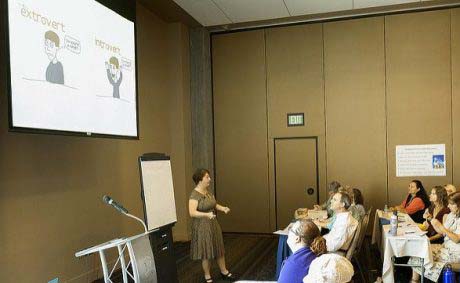Extrovert vs Introvert: How Does Each Experience Depression?

Extrovert vs introvert: of any of C.G. Jung’s concepts, these two are probably used the most, with the greatest impact.

Most of us have some understanding of extroversion and introversion. They are actually very complex concepts, but we can say that extroverts are people primarily energized by their interaction with other people, while introverts are those who are primarily energized by their time spent alone.
These are valid concepts, but they lead to a lot of unwarranted misconceptions and stereotypes. One area where this becomes brilliantly clear is in the discussion of extroversion, introversion and depression.
Isn’t Introversion the Same Thing as Depression?
No, it certainly isn’t! Yet the stereotype of introversion might lead us to think so. It’s commonly thought that introversion is the same thing as shyness. As Susan Cain, the author of Quiet: the Power of Introverts helpfully points out,
Bill Gates is quiet and bookish, but apparently unfazed by others’ opinions of him: he’s an introvert, but not shy.
Barbra Streisand has an outgoing, larger than life personality, but a paralyzing case of stage fright: she’s a shy extrovert [italics mine].
Shyness, being fearful in a social situation, gets confused with introversion, which is about being motivated to spend time alone, and perhaps motivated to seek out different types of social interaction than extroverts. Introversion is about what matters to the person, in terms of relationship to themselves and to others. Depth case studiess know that it is not at all the same thing as shyness, and it certainly is not the same thing as depression!
Well, Aren’t Introverts more Likely to Get Depressed Than Extroverts?
Not really. Introverts actually like being alone. This can lead to their being seen as having more depressed or negatively inclined personalities. Yet, actually, this perception stems from an extroverted culture’s assumption that introverts feel sad, depressed or enervated if they didn’t get to spend enough time with people. That’s valid for extroverts, but it’s not appropriate for us to project those same feelings on introverts.
However, introverts often do spend more time thinking and analyzing than extroverts. If they get stuck in thinking and analyzing in such a way that they perpetually ruminate on the dark side, this is a pattern that can feed depression, as research by Yale’s Susan Nolen-Hoeksema shows. But then, as we will see, there are particular characteristics of those who present as extroverts that can lead to unique pathways to depression as well.
Can Depression Ever Make Someone More Introverted?
Sometimes, people who have a hard time looking at the more reflective, introverted parts of their lives can find themselves compelled to do so when they lapse into depression.
For instance, Jungian Analyst Dr. Warren Steinberg observed that, in his practice, a great many people who experienced depressive disorders were actually living extremely extroverted lifestyles. For a significant number of these individuals, Steinberg concluded, extreme extroversion developed as a defense in childhood environments where, in his words “Behaviour other than submission to the parents’ construction of reality led to the threat of the loss of love.”
Such individuals become hyper-attuned to responding to the needs of others, and to keeping the peace. They learn to avoid introversion, or looking within, both for fear that what they may discover in the unconscious may bring depression, and also for fear that even paying attention to their inner lives may frighteningly threaten the love and acceptance that they receive from parents and others.
Individuals suffering from this type of depression actually need to learn to be more introverted. They may well need to come to terms with the fear of loss and sense of emptiness they associate with attunement to their inner selves.

Extrovert vs. introvert: each has its own unique experience of depression. In each case, the path out of depression may well involve a greater experience of the opposite. For introverts, that may entail greater experience and connection with the outer world, while for extroverts, a greater connection with the introverted inner world may be what is needed.
In /a-midlife-transition, greater personal exploration of introversion and extroversion is often a key part of the individuation process of the human individual.
Brian Collinson, Registered Psychotherapist & Jungian Psychoanalyst
[cta]
